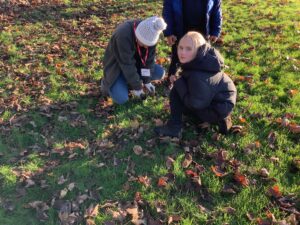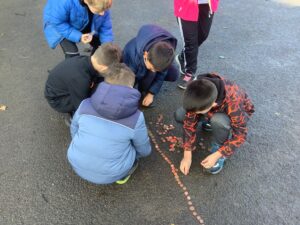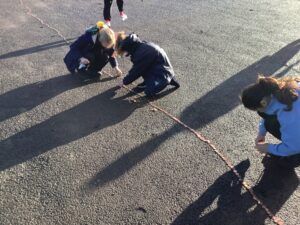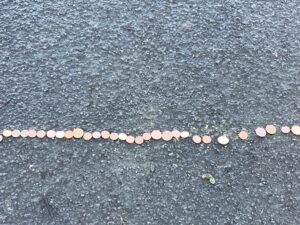This week’s message (Friday 01 December 2023)
It’s the first day of December and the weather certainly matches the season!
We’ve still a while to go before the end of term and there’s lots of learning and socialising to be done in the next few weeks. The last week of the Autumn term – coming up in three weeks’ time – is always a busy one. Please check our school calendar for all the events happening so you don’t miss out.
Talking of events…
Today’s been a busy one in school.
We started the day with the last of three open sessions for prospective new parents for a September 2024 Reception place. If you know of anyone who has a child start school, please mention us!
And we ended it with another open session – this time for you, our existing family of parents, to check out all the learning in our topics so far this year. If you managed to come along, thank you! There’s another topic review on Monday 18 March, and before then, a Watch Us While We Work session on Friday 26 January.
Just two more things in this week’s message…
First, a quick reminder: if you’ve got any new contact details for you or other contacts, please remember to let us know. We need up-to-date details for the people on our lists in case of emergencies. (The people on our lists are the ones you gave us when your child school – in most cases, this will be three different people.)
Second, here’s an extract from an Ofsted blog…
Persistent school absence is one of the most significant ongoing impacts of the pandemic. The latest data shows that nearly 1 in 4 pupils were absent for 10% of school sessions in autumn 2022, nearly double the position in 2019. We remain very concerned about the effect this will have on children.
As the Department for Education (DfE) points out in its blog Why is school attendance so important and what are the risks of missing a day?, we know that the highest attendance rates are linked with the best outcomes at all key stages. Even missing small amounts of education can mean a child misses important sections of the curriculum and may therefore struggle to learn concepts that are built on what they missed.
And it’s not just about the academic opportunities. There’s value in the whole school experience. Learning with peers, enjoying sport and music, building relationships with adults beyond their families, and building friendships – these are the building blocks of well-being and a good life. School contributes so much to this.
It is therefore vital that children are in school as much as possible.
Thank you for helping to make sure your child’s in school. Don’t forget to check the NHS site to decide – in most cases, it’s fine to send your child to school with a minor cough or common cold.
Have a great weekend – stay warm!
Vacancies
We currently have some job vacancies at St James’. Please check out our vacancies page on the website or contact the school office for more information.
Wetherby in Bloom visit
Wetherby in Bloom have kindly donated 500 bulbs to brighten up our playground. Some children, parents and staff have been helping the Wetherby in Bloom volunteers plant them ready for Spring. We thank them for their donations and support.



This year’s school charity
After voting in classes, the Junior Leadership Team had the final vote on the charity we will be supporting this year. There was an overwhelming majority for The Children’s Heart Surgery Fund. This is a Leeds based charity.
This is their mission:
‘Our vision is to support hearts for life and our mission is to support the Leeds Congenital Heart Unit as a world-class centre of excellence – by providing the funding and resources needed to care for a patient’s heart, mind, family and future.’
We look forward to raising funds to support this fantastic charity.
This week’s message (Friday 24 November 2023)
On these darker, colder mornings, it’s still a highlight of our day to stand at the school gate and be greeted by happy and healthy children ready for a day of learning in class and socialising in school.
This week’s message has various things to check out…
Check out these seven top tips
The week’s Living and Learning statement has been I know how important it is to make careful choices when online. Use this page from Childline to support your discussions at home – just reading the website alongside your child will help. Check out Childline’s seven top tips.
Check out the checks
Children in Year 1 and in Year 4 take part in national assessments – the Government calls these ‘checks’. They take place towards the end of the school year.
If your child is in Year 1, they’ll do a phonics screening check. Someone in school will carry out this with each child on a one-to-one basis in the week beginning Monday 10 June 2024. The phonics screening check is an assessment of your child’s phonics knowledge – a fundamental key to learning to read.
If they’re in Year 4, they’ll do a multiplication tables check. This is carried out online. It’ll take place in the first half of June 2024. The purpose of the check is to determine whether your child can fluently recall their times tables up to 12 (including the division facts), which is essential for future success in Maths.
Read more about these assessments by clicking on the links.
Check out the dates for all national assessments.
Check out these ways to support good mental health
Young Minds is a mental health charity for children, young people and their parents. They’ve produced this advent calendar full of top tips for wellbeing. It’s worth a look, whether you use it as a calendar or just decide to give one or two of the tips a try. We like the tip on Monday 4th – easy, but so effective!
Check out The Big Ambition
The Children’s Commissioner for England, Dame Rachel de Souza, has launched The Big Ambition, a national survey of children and young people across England. Has your child taken part yet?
The survey wants to hear from children across England on what they think is important. The Children’s Commissioner writes:
I want to ensure that the voices of all children in the Yorkshire and the Humber area are fairly represented in the findings so that I can share their views with the most senior members of the country.
I must reiterate that it is vital that all children have their voice heard through this survey because, as Children’s Commissioner for England, I have a statutory duty to protect and promote the views and interests of children. The Big Ambition provides a much-needed opportunity for the children of England to tell political decision makers what is important to them ahead of the General Election. I will be sharing their responses with Government to ensure that children’s voices are heard.
Wreath making
Last night, some of our parents and staff had a wonderful time making Christmas wreaths. This was a PTA organised event to raise some funds for school but also a chance for people to get together and have fun.
The finished products look great!

17 November 2023
Our whole-school homework this week is:
Reading: please make sure your child is reading on a daily basis.
Number Fact Fluency: Use Numbots or Times Table Rock Stars in regular short bursts.
Talk Time
Our Talk Time homework this week is all about charity.
To start the discussion at home, talk with your child about charities. Things you might talk about are how charity is the act of giving help to those in need of it. It involves giving money, goods or time to those that need it, without expecting something in return.
Soon, the Junior Leadership Team will choose our new charity. Each school leader in Sphere Federation has suggested a charity and now it’s over to you. Spend some time at home considering each of the six shortlisted charities below. Which one will your child encourage the junior leaders in school to vote for?
Did you know you can find out more about any registered charities really easily:
https://www.gov.uk/government/organisations/charity-commission
This site tells you lots of facts and figures about different charities – even things like how much income they receive and how many workers and volunteers they have.
You might use this site to decide which of the six charities to support. (In the list below, the text in italics is taken from the Charity Overview page from the site.)
The Children’s Heart Surgery Fund
The main objective of the charity is to enhance the quality of care and support available to babies, young children and adult congenital cardiac patients, who are treated at the Leeds Congenital Heart Unit, based at Leeds General Infirmary.
Zarach
We receive referrals through our network of schools. We deliver a bed bundle for every child in the household that requires it; this includes a brand-new Bed, Mattress, Duvet, Pillow, Bed Sheets, Pyjamas and Hygiene Kit. We work with local partners to include Food Parcels and, if needed, a school uniform. We can also mediate between families and their support services, as well as making referrals.
Leeds Hospitals Charity
To further any charitable purpose or purposes relating to the general or any specific purposes of Leeds Teaching Hospital Trust or the purposes of the National Health Service.
https://www.leedshospitalscharity.org.uk
Simon on the Streets
Objectives are to: 1) prevent and relieve hardship and need and distress amongst those who are homeless and rootless by the provision of practical and emotional support, in particular but not exclusively to those who are sleeping rough or who are unwilling or unable to accept existing provision; 2) educate the public concerning the problems of social isolation and homelessness.
https://simononthestreets.co.uk/
Trussell Trust
The Trussell Trust supports a nationwide network of food banks and together we provide emergency food and support to people locked in poverty, and campaign for change to end the need for food banks in the UK.
Mind (The National Association for Mental Health)
We provide information and support, campaign to improve policy and attitudes and, in partnership with independent local Minds, develop and provide local services.
The charities will be reviewed in class on Thursday 23 November. Each class will vote for one charity which will be brought to the Junior Leadership Team who will have the final vote on Friday 24 November.
This week’s message (Friday 17 November 2023)
This week, we marked Anti-Bullying Week. Make sure your child knows our definition of bullying (Several Times On Purpose) and the solution (Start Telling Other People).
Near the start of each half-term, Mr Wilks writes the weekly message to tell you more about the current topic in school…
What do we mean by topics?
Topics are the way we deliver much of the learning in the foundation subjects (eg history, art, geography, DT). Each half-termly topic has a driving subject – the main focus for teaching pupils the knowledge and skills they need to succeed in life. The driver changes with each topic to ensure a broad and balanced curriculum.
Although the learning in each topic is provided by the driving subject, there are opportunities for enrichment through other subjects. For example, learning in an art topic may be enriched by geography learning about where an artist was born and lived.
What is this half-term’s topic?
This half-term, we’re artists: we’re developing our art knowledge and skills. The learning this half-term has two aspects to it. In art history and appreciation lessons, children learn about some specific artists and their work. In art process lessons, children practise and develop skills by creating art.
Each phase has age-related specific knowledge, skills and vocabulary that they’ll learn, use and apply across the topic. Follow this link to the Curriculum Guide to find out more.
Years 1 and 2
Children have two featured artists: Leonardo Da Vinci and Paul Klee. They’ll compare their art, talking about similarities and differences. They’ll discuss what they like and dislike about the art and how it makes them feel. They’ll also learn about the artists’ lives and where in the world they lived.
In practical art lessons, children will hone their artistic skills and knowledge by sketching objects using pencil, learning about and mixing colour and then they’ll be learning how to print by creating relief prints inspired by the artwork they’ve studied.
Part way through the half-term, they’ll visit the Hepworth Gallery for a printmaking workshop to complement the learning in school.
Years 3 and 4
Children will learn about the work of Wassily Kandinsky and Martha McDonald Napaltjarri. They’ll compare and contrast the artworks by these artists and also learn about their lives and the places they lived. In particular, children will learn about abstract and figurative art (see the vocabulary for definitions of these words).
In practical art sessions, children will develop observational drawing skills and their understanding of colour by learning about warm, cold and complementary colours. They’ll then apply what they’ve learnt by creating sculptures inspired by the artists they’ve studied.
Years 5 and 6
Children in Years 5 and 6 are learning about sculpture in their art lessons and will focus on three artists: Thomas J Price, Henry Moore and Barbara Hepworth.
The children have already been on their school trip to the Yorkshire Sculpture Park this week. They’ve seen and learned about sculptures by these artists. In art history and appreciation lessons, they’ll learn about the lives of these artists and how their localities have influenced their art. They’ll learn about classical and modern art in relation to their featured artists and in art movements more generally. They’ll also learn when and why the modern art movement happened.
In practical art lessons, children will continue to develop their observational skills and will create maquettes (see the vocabulary list) inspired by the work of Barbara Hepworth.
How can you help?
Talk to your child about what they’ve been learning in class. The class news page of the school website is a good place to go to find out more about what the children are doing.
Familiarise yourself with the artists and the artwork that your child is learning about. Look in books or on the internet for pieces by the artists and talk about them. Find art by other artists that you like and compare it to the featured artists. If you feel confident, you can go into more depth using the vocabulary. However, if not, leave that to the teachers and just enjoy looking at the pieces and asking general questions:
- What do you like or dislike about the art?
- How does the art make you feel?
- Is it life-like or not?
- What colours can you see?
The Tate Gallery has a good children’s website with games and activities which children can explore.
If you’re in Leeds, the Leeds Art Gallery and Henry Moore Institute are both free to enter.
Finally, thanks for any donations you made to Children in Need today.
Have a good weekend.
Children in Need
Thank you for all your support raising money for Children in Need.
We have raised £140 for the charity.


Penny trail
As part of Me and My Money themed week, we created a penny trail in our playground. Thank you to everyone who brought in some spare pennies to make the trail extremely long. We raised £45 just from one pence coins! The money raised will go to Cancer Research UK.


